ROSWELL, Ga. — Before the Mile High magic in the 2011 playoffs, before the five Pro Bowls and before he became a Super Bowl champion, Demaryius Thomas was just a kid from a small town in Georgia.
But his life changed forever on draft night in 2010, when Thomas was selected by the Broncos with the 22nd-overall pick. That evening was "one of the most exciting nights," Thomas recalled. With his aunt, uncle and cousins with him at New York City's Radio City Music Hall, he beamed as he became the first wide receiver off the board.
The next day, Thomas arrived in the city he would call home for nine years on a chilly, rainy day.
"I knew nothing about Denver," Thomas said. "Never been. First time. A new beginning."
In spite of the dreary weather, the future seemed bright. At the time, Thomas' entire career lay in front of him, nothing but potential.
Thomas was far from a finished product as he prepared to begin his NFL career. He had enormous raw talent: tremendous speed and agility, great size and a remarkable toughness. The main thing he lacked then was traditional route-running skills; in Georgia Tech's triple-option offense, Thomas hadn't run traditional routes. The Broncos trusted that would not be much of an obstacle for him.
It was through his relentless work ethic that Thomas ensured that he could be the player the Broncos thought he would be. Despite injuries that threatened the early years of his career and facing the self-doubt that followed, he dedicated himself to chasing greatness.
Soon enough, he found it. His 80-yard catch-and-run to win the overtime playoff game against the Steelers marked a turning point in his career, and the arrival of Peyton Manning months later helped him reach new levels as a receiver.
The individual and team accolades followed: five Pro Bowls, five AFC West titles, two AFC Championship victories, a Super Bowl 50 win. Thomas was the most dangerous receiving threat on many of those teams, as well as the ones that followed after Manning retired.
During his nine years, Thomas built a career that easily ranks among the franchise's best. And he did build it. He invested the time and resources to take sharpen his skills and to take care of his body to become someone whom teammates and coaches could rely upon. After those injuries in 2010 and 2011, Thomas began a 114-game starting streak (regular season and playoffs) that no other Broncos receiver has matched.
In reflecting on his career, Thomas accepts his career for all that it was. He knows that he may not be unequivocally considered the best Broncos receiver ever. The success he found at the position at an individual level and being a trusted teammate who helped the team achieve the ultimate goal was enough.
"The main thing is I don't consider [that] I've got to be the best to come," Thomas said. "I know it's hard to go up against Rod [Smith] or whoever that's going to be next. I just want to be considered as one of the best to come through there. I tried to do my best. I put it all on the line, each and every week — even in practice, I tried to practice all the time. My thing is it's being there when we needed it."
Thomas can admit that it wasn't all good times — "Ups and downs — I had my good days and my bad days, but we all do," he said — but he was always willing to do as much as was asked of him.
"It wasn't all about going to get the catch," Thomas said. "It was times where if we needed a big block, I might do that. Or whatever it was, I was just making sure I was there for my team and my guys so I can take pressure off of somebody maybe or spring up or open a big block for somebody, whatever it was. It wasn't never really about me. I was trying to do it for the team."
It was always about more than himself, and really it was more than the game for him. Football would help him find financial security to support him well after retirement from the NFL, and it'd help bring his family back together after his mother and grandmother both were sentenced to lengthy prison sentences for nonviolent drug offenses when he was just 11 years old.
"I remember when my momma was going to prison," Thomas said. "I told her, There's something that I'm going to go pro in, because me and her played together mostly in sports, basketball or football, whatever it was. When they went away, I got good at football and I just chased it and chased it and chased it. It has done wonderful things for me and my family."
For almost two decades, Thomas did his best to deal with the painful separation, staying in contact with his mother and grandmother as he grew from an adolescent to an NFL star through phone calls.
His life and the lives of his family members would change in 2015 when his mother, Katina Smith, was one of 46 people who had their sentences commuted by President Barack Obama. A year later, Thomas' grandmother, Minnie Pearl Thomas, received clemency as well.
After the Broncos won Super Bowl 50, Thomas had the chance to personally thank Obama at the White House, which was obviously a very special moment. Thomas recalled that Obama remembered the situation when they met.
"I've been able to get my mom and grandma out of prison — I don't know if football did it, but winning the Super Bowl and meeting Obama after that situation, they both kind of got out, which I was thankful for," Thomas said. "But football has done a lot; [I've] been able to take care of myself and a lot of people and a lot of other people."
One thing that never changed about Thomasin Denver, though, was that he always made time for children. He made a habit of visiting kids at the Boys & Girls Club, making friendships that he long maintained. Quick to smile, Thomas never tired of sharing that gift with children who may be experiencing tough times.
"Hopefully I ain't gone from Denver for long, but my impact when I was there was just trying to give back when I could," Thomas said. "I didn't know all the directions of where to go because I didn't have my mom and dad around at all times or the leadership to go in what direction, but it was just trying to give back and be around kids to show them whatever to put a smile on their face because they put smiles on my face and I know they're our next generation."
Sometimes his connections in the community became the strongest ones he made. In the case of the Durkee family, who suffered the devastating loss of 11-year-old son Drake in a 2015 rafting accident, Thomas learned that Drake had been a huge fan of his. Drake had even been buried in a Demaryius Thomas jersey, Thomas was told.
Thomas sent a letter to the family expressing his grief, invited them to his annual youth football camp that summer, when he started an award in Drake's honor. That season, as the Broncos marched to Super Bowl 50, Thomas wore a "Drake 88" wristband in his honor, including at the championship game. He still speaks with the family, he says, and recently talked with Drake's dad.
"They're like part of my family now," Thomas said.
Whether in a Broncos uniform or out of one, Thomas' heart was evident throughout the entirety of his career. We could watch as Thomas grew, as his life was transformed and as he transformed the lives of others.
Through the ups and downs — playoff wins and painful injuries, stunning touchdowns and sporadic drops — he could remind us that this was still an essentially human experience, an open display of someone working through their struggles to touch greatness.
Sometimes it seems like we want our sports heroes to be only Superman, no Clark Kent — but we must remember being superhuman still means you are human. While Thomas almost always made his orange and blue uniform look like a red cape, once in a while we could see where he wore his glasses. And that's what made his triumphs so gratifying to watch.
Demaryius Thomas' time with the Broncos was unforgettable — he made game-winning plays, set franchise records, helped the Broncos reach two Super Bowls — including a win in Super Bowl 50 — and he was a star in the community.
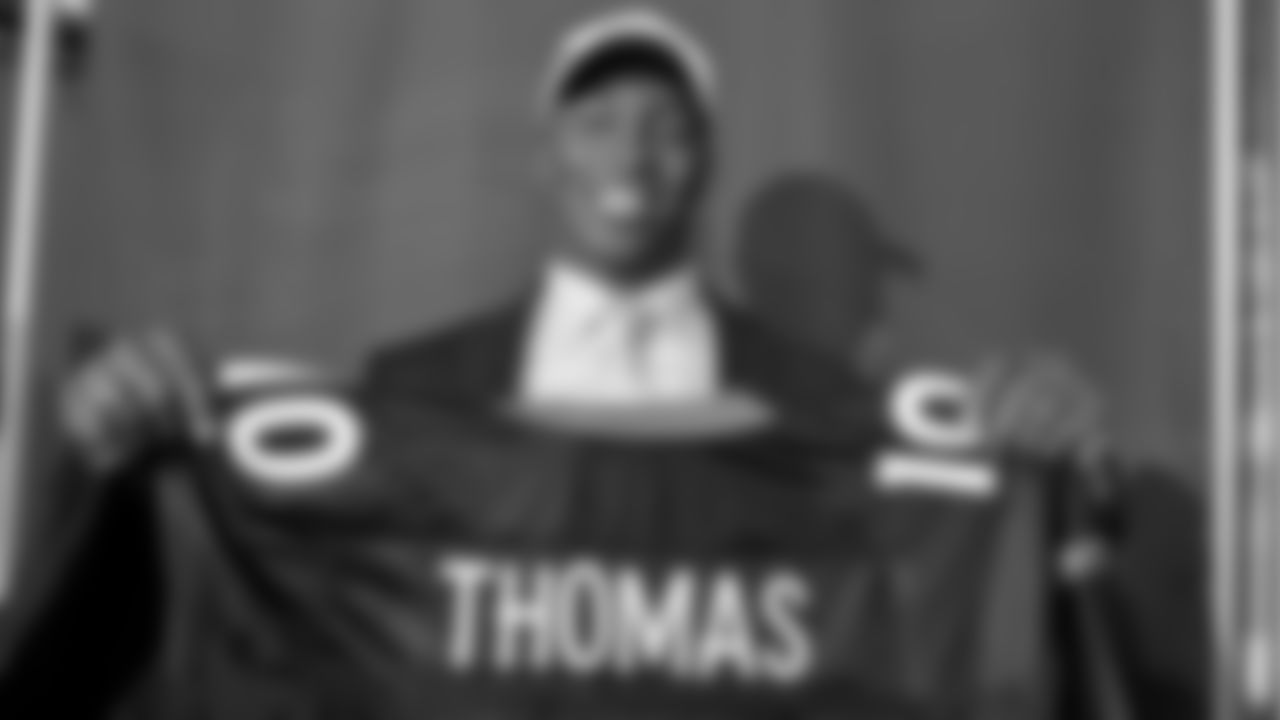
First-round draft pick Demaryius Thomas displays his jersey to the media during his introductory press conference on April 23, 2010.

First-round draft pick Demaryius Thomas arrives at Dove Valley headquarters in snow flurries on April 23, 2010.

Demaryius Thomas flashes a smile in the end zone after completing a 21-yard touchdown catch against the Seattle Seahawks on Sept. 19, 2010. It was the first touchdown catch of his career.

Demaryius Thomas smiles after he contributed eight receptions for 97 yards and a touchdown in his NFL debut against the Seattle Seahawks on Sept. 19, 2010.

Demaryius Thomas holds a young child at the Denver Rescue Mission Holiday Party on Dec. 13, 2011.

Demaryius Thomas turns upfield on a 41-yard catch and run for a touchdown in third quarter action against the Minnesota Vikings in the on Dec. 4, 2011.
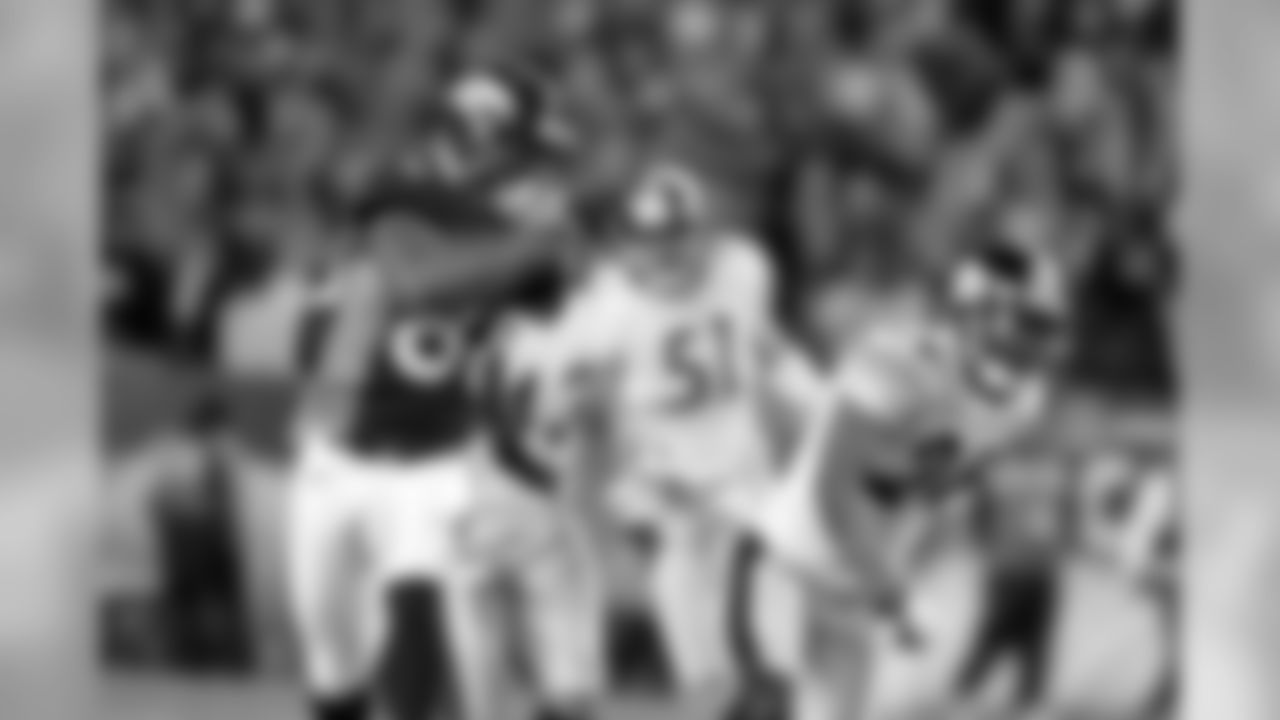
Demaryius Thomas creates separation from Steelers cornerback Ike Taylor on an 80-yard catch and run for a touchdown to win the game in overtime of an AFC Wild Card playoff game on Jan. 8, 2012.

Demaryius Thomas scores the game-winning touchdown against the Steelers in overtime of the AFC Wild Card playoff game on Jan. 8, 2012.

Demaryius Thomas strolls the aisles with a Boys & Girls Club shopper during the annual Shop with a Bronco on Dec. 6, 2011.

Demaryius Thomas runs out of the tunnel during player introductions before a preseason game on Aug. 18, 2012.

Peyton Manning chats with Demaryius Thomas on the sideline during the team's first Organized Team Activity held at the Dove Valley facility on May 21, 2012.

Demaryius Thomas catches a 38-yard pass for a first down against the New England Patriots on Oct. 7, 2012.

Demaryius Thomas catches the ball during first quarter action against the New Orleans Saints on Oct. 28, 2012.

Demaryius Thomas looks for extra yards after a reception against the Tampa Bay Buccaneers on Dec. 2, 2012.

Demaryius Thomas takes the field before a game against the Chargers on Nov. 18, 2012.

Demaryius Thomas runs upfield after a reception against the Cleveland Browns on Dec. 23, 2012.

Demaryius Thomas hauls in a 22-yard touchdown reception against the Cleveland Browns on Dec. 23, 2012.

Fans celebrate with Demaryius Thomas after he caught an 8-yard touchdown pass against the Tampa Bay Buccaneers on Dec. 2, 2012.

Demaryius Thomas scores a touchdown during against the Baltimore Ravens in the AFC Divisional Playoff game on Jan. 12, 2013.

Demaryius Thomas, Wes Welker and Eric Decker pose for a 2013 Gameday Magazine cover on Aug. 13, 2013.

Demaryius Thomas has some fun in the rain outside the locker room at a training camp scrimmage at Sports Authority Field at Mile High on Aug. 3, 2013.

Demaryius Thomas catches a 26-yard touchdown pass against the Baltimore Ravens on Sept. 5, 2013.

Demaryius Thomas jumps into the stands after scoring a touchdown against the Philadelphia Eagles on Sept. 29, 2013.

Demaryius Thomas pushes off a Chiefs defender as he heads up the sidelines on a 20-yard reception on Nov. 17, 2013.

Demaryius Thomas points to the camera while he stretches before a game against the Washington Redskins on Oct. 27, 2013.

Demaryius Thomas hauls in a 15-yard pass for a touchdown against the Philadelphia Eagles on Sept. 29, 2013.

Demaryius Thomas holds the football across the goal one on a 5-on Dec. 29, 2013. The pass to Thomas from Peyton Manning set a new NFL record for passing yards in a single season with 5,477 yards.

Demaryius Thomas carries the ball in for a touchdown after a reception against the San Diego Chargers on Nov. 10, 2013.

CBS's Jim Nantz interviews Demaryius Thomas after Denver defeated the New England Patriots in the AFC Championship Game on Jan. 19, 2014.

Demaryius Thomas holds up the Lamar Hunt Trophy after defeating the New England Patriots in the AFC Championship Game at on Jan. 19, 2014.

Demaryius Thomas hangs on to a 14-yard reception for a touchdown against the Seattle Seahawks during Super Bowl XLVIII on Feb. 2, 2014.

Demaryius Thomas catches a 12-yard pass for a touchdown with two Chiefs defending him on Sept. 14, 2014

Demaryius Thomas celebrates with the fans in the south stands after he ran 31 yards on a reception for a touchdown on Oct. 5, 2014. Thomas set a franchise record for receiving yards in a single game with 226.

Demaryius Thomas reaches for a deep pass which caught and took for a 86-yard touchdown against the Arizona Cardinals on Oct. 5, 2014. Thomas set a franchise record for receiving yards in a single game with 226.

Demaryius Thomas runs for an 86-yard touchdown reception against the Arizona Cardinals on Oct. 5, 2014. Thomas set a franchise record for receiving yards in a single game with 226.

Demaryius Thomas runs past a diving Cardinals defender for a touchdown on Oct. 5, 2014. Thomas set a franchise record for receiving yards in a single game with 226.

Raiders defensive back Charles Woodson tries to bring down Demaryius Thomas on Nov. 9, 2014.

Demaryius Thomas catches Peyton Manning's 8-yard pass for Manning's NFL-record 509th career touchdown pass against the San Francisco 49ers on Oct. 19, 2014.

Peyton Manning celebrates his NFL-record 509th passing touchdown with Demaryius Thomas, who caught the pass, on Oct. 19, 2014.

Demaryius Thomas hauls in a 40-yard touchdown reception against the San Francisco 49ers on Oct. 19, 2014.

Orlando Franklin lifts Demaryius Thomas after scoring a touchdown against the Miami Dolphins on Nov. 23, 2014.

Demaryius Thomas catches a pass against the Kansas City Chiefs on Sept. 17, 2015.

Demaryius Thomas fires up the crowd during a game against the Patriots on Nov. 29, 2015.

Demaryius Thomas carries the ball for a 72-yard touchdown against the San Diego Chargers on Jan. 3, 2016.
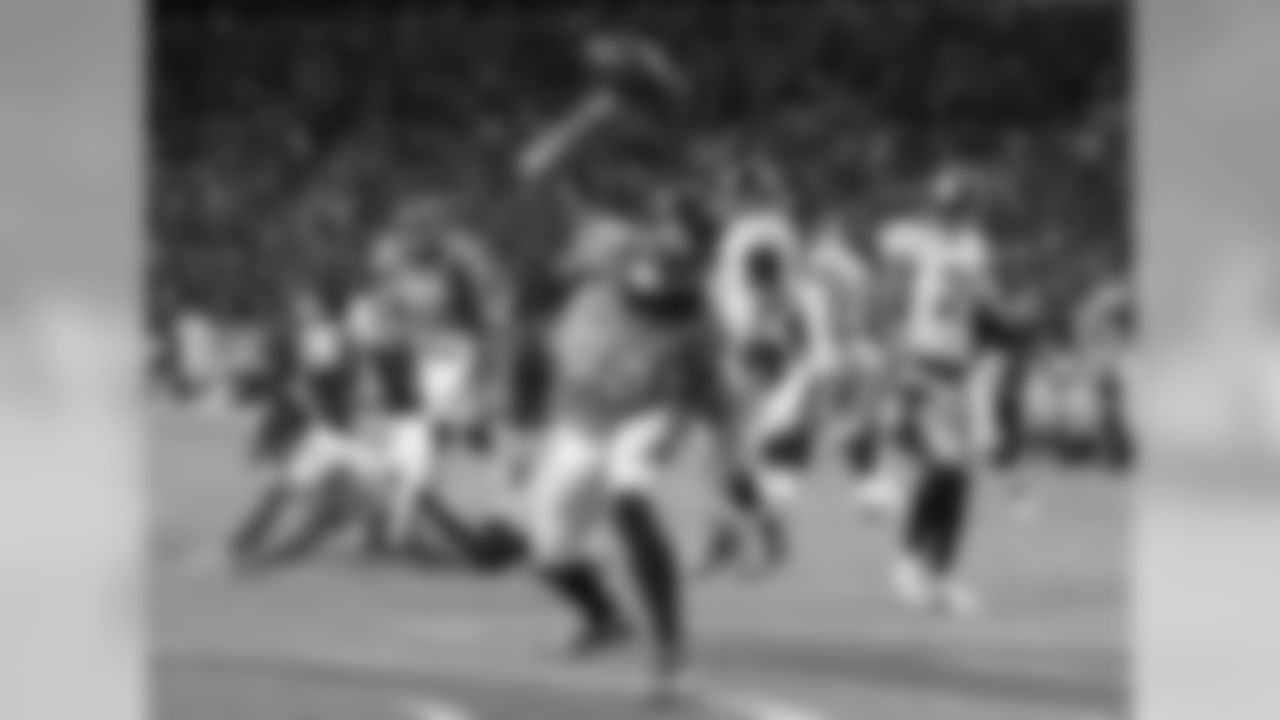
Demaryius Thomas spikes the ball after scoring on a two-point conversion against the Pittsburgh Steelers on Jan. 17, 2016.

Emmanuel Sanders and Demaryius Thomas celebrate in confetti after beating the New England Patriots in the AFC Championship Game on Jan. 24, 2016.

Demaryius Thomas celebrates with DeMarcus Ware after the Broncos beat the New England Patriots in the AFC Championship Game on Jan. 24, 2016.

Demaryius Thomas smiles in the locker room as he gets ready for practice during the week leading up to Super Bowl 50 on Feb. 5, 2016.

Demaryius Thomas introduces Peyton Manning to Thomas' mother, Katina Smith, after walkthrough for Super Bowl 50 on Feb. 6, 2016.

Demaryius Thomas celebrates with Aqib Talib after beating the Carolina Panthers in Super Bowl 50 on Feb. 7, 2016.

Demaryius Thomas pushes Marshall Manning, Peyton Manning's son, through the locker room in an equipment container after the Broncos beat the Carolina Panthers in Super Bowl 50 on Feb. 7, 2016

Demaryius Thomas stands atop a fire truck and waves to the crowd during the Broncos' championship parade through downtown Denver on Feb. 9, 2016.

Demaryius Thomas (back row, holding Marshall Manning) takes a group photo with Peyton Manning and other Broncos teammates after Manning's retirement press conference on March 7, 2016.

Demaryius Thomas, among others, looks on as then-President Barack Obama speaks to the crowd during a ceremony honoring the team's Super Bowl 50 victory.

Demaryius Thomas during the Broncos' Super Bowl 50 ring ceremony on June 12, 2016.
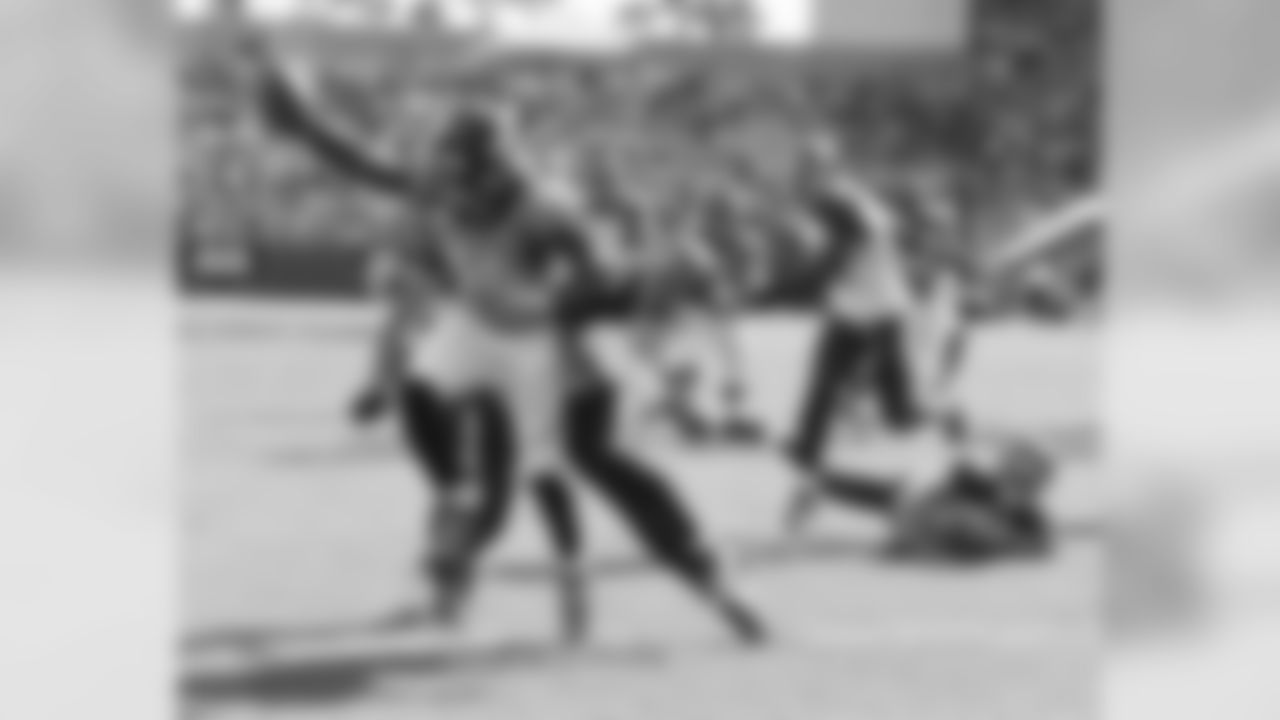
Demaryius Thomas scores on an 11-yard reception for a touchdown against the Tampa Bay Buccaneers on Oct. 2, 2016.
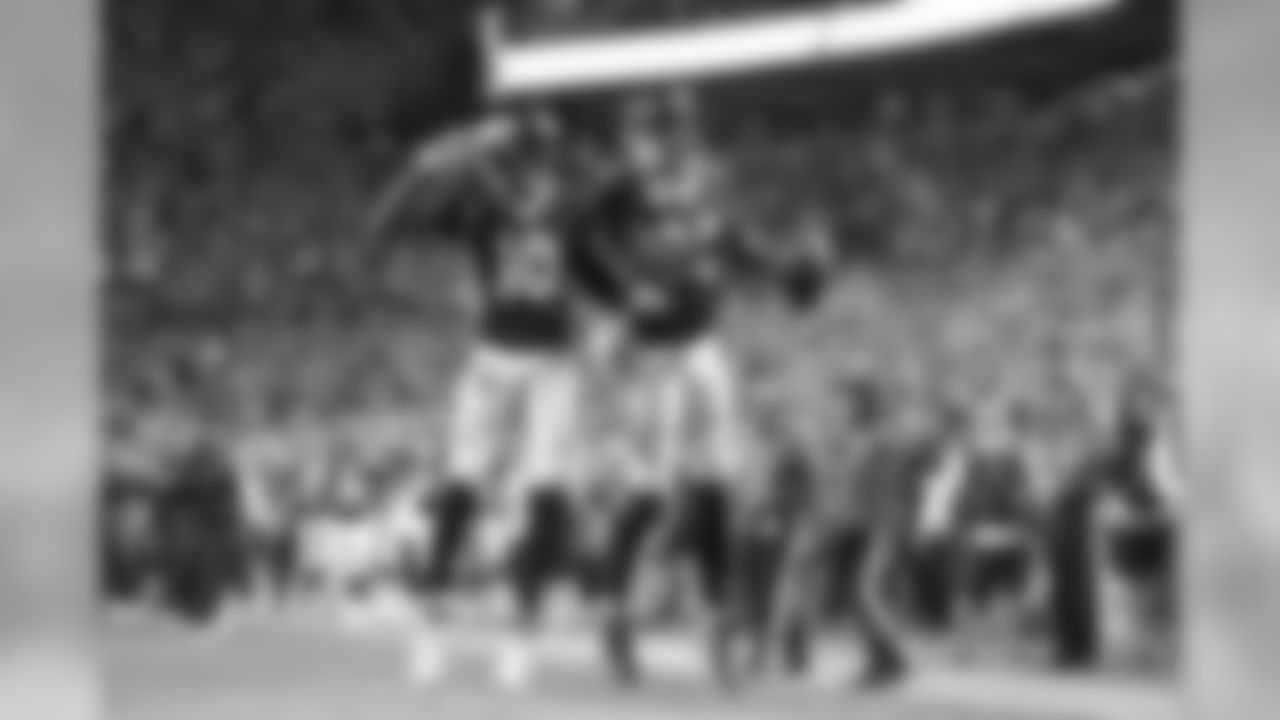
Demaryius Thomas celebrates his 4-yard touchdown catch with Emmanuel Sanders on Oct. 24, 2016.

Demaryius Thomas outmuscles a Saints cornerback for a touchdown on Nov. 13, 2016.

Demaryius Thomas and Eric Studesville's son, Eric Jr., hang out before a walkthrough on Dec. 31, 2016.

Demaryius Thomas autographs a football before the Broncos' game against the Raiders on Jan. 1, 2017.

Demaryius Thomas stiff arms a Raiders defender on Jan. 1, 2017.

On his right arm, Demaryius Thomas sports tattoos recalling his first day as a Denver Bronco and the Super Bowl 50 trophies he won as part of the team.

At Demaryius Thomas' youth football camp at Mullen High School on July 7, 2017.

Demaryius Thomas takes a photo with a fan before a Broncos preseason game on Aug. 31, 2017.

Demaryius Thomas takes a photo with Malachi, a child who toured UCHealth Training Center and met players on Sept. 29, 2017 as part of his Make-A-Wish experience.

Demaryius Thomas smiles as he meets a baby girl, who visited practice during a family member's Make-A-Wish visit to UCHealth Training Center.

Demaryius Thomas meets Children's Hospital Colorado Junior Reporter Caleb Aldrich after practice at UCHealth Training Center on Sept. 27, 2017.

Demaryius Thomas is introduced to the home crowd before a game against the Cincinnati Bengals on Nov. 19, 2017.

Demaryius Thomas runs out onto the field during pregame player introductions on Nov. 19, 2017.

Demaryius Thomas huddles with the team in the locker room after the Broncos beat the New York Jets on Dec. 10, 2017.

Demaryius Thomas catches a touchdown pass against the Cincinnati Bengals on Nov. 19, 2017.

Demaryius Thomas, dressed as Santa Claus, gives a big hug to kids during the Boys & Girls Club Holiday Party at UCHealth Training Center on Dec. 18, 2017.

Demaryius Thomas, dressed as Santa Claus, visits the Boys & Girls Club Holiday Party at UCHealth Training Center on Dec. 18, 2017.

Demaryius Thomas poses with Matt Paradis at a walkthrough practice at UCHealth Training Center on Dec. 13, 2017.

Demaryius Thomas shows his excitement in the tunnel before player introductions for the game against the Kansas City Chiefs on Oct. 1, 2018.

Demaryius Thomas autographs a jersey a young boy is wearing after a training camp practie on Aug. 9, 2018.

Demaryius Thomas stretches during training camp at UCHealth Training Center on Aug. 5, 2018.

Demaryius Thomas celebrates with Tim Patrick and Emmanuel Sanders after hearing his touchdown counts during the game against the Seattle Seahawks on Sept. 9, 2018.

Demaryius Thomas in the tunnel pregame before the Broncos' preseason game against the Minnesota Vikings on Aug. 11, 2018.

Chase, a Children's Hospital Colorado Junior Reporter, receives an autographed helmet from Demaryius Thomas at UCHealth Training Center on Sept. 26, 2018.

Demaryius Thomas gives out high-fives to fans in the tunnel during player introductions before the game against the Kansas City Chiefs at Broncos Stadium at Mile High on Oct. 1, 2018.

Demaryius Thomas gets his feet in on a touchdown catch against the Los Angeles Rams on Oct. 14, 2018.

Demaryius Thomas and Von Miller greet Cardinals receiver Larry Fitzgerald after the Broncos' game against the Arizona Cardinals on Oct. 18, 2018.















